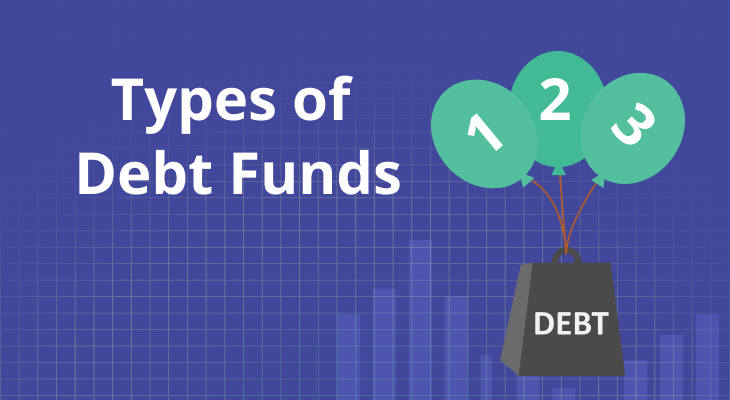Types of Debt Funds

Debt funds are a popular investment choice among individuals seeking stability and income generation. These funds primarily invest in fixed income securities such as government bonds, corporate bonds, and money market instruments. There are various types of debt funds available to invest in, each with its own characteristics and risk profiles. Let us take a look at the different types of debt mutual funds, highlighting their key features and benefits.
Types of Debt Funds
- Gilt Funds Gilt funds invest primarily in government securities issued by the central or state governments. These funds carry minimal credit risk as they are backed by the government. Gilt funds are suitable for investors seeking safety and stability, especially those with a lower risk tolerance. They provide regular income through interest payments and are ideal for preserving capital.
- Income Funds Another type of debt mutual fund, Income Funds, are focused on generating regular income through investments in a mix of debt instruments with varying maturities and credit ratings. These funds offer a balance between income generation and potential capital appreciation. Income funds are suitable for investors looking for a steady stream of income along with the opportunity for moderate growth.
- Liquid Funds If you’re looking to park surplus cash for an interim period or meet short-term financial goals, then a Liquid fund is the right option for you. These funds invest in money market instruments with a maturity of up to 91 days, making them highly liquid in nature. Liquid funds provide stability and safety of capital while offering competitive returns, and enable easy and quick redemption.
- Short-Term Funds Short-term funds have a slightly longer investment horizon compared to liquid funds. They invest in debt instruments with relatively shorter maturities, typically up to three years. Short-term funds aim to provide stable returns while minimizing interest rate risk. These funds are suitable for investors with a moderate risk appetite looking for a balance between income generation and potential capital appreciation.
Ultra short-term funds, as the name suggests, are a type of debt fund that invest in fixed income securities with very short maturities, usually less than a year. These funds are designed to provide a slightly higher yield compared to traditional liquid funds while maintaining a high level of liquidity and capital preservation. Ultra short-term funds primarily invest in money market instruments and short-term debt securities. They are well-suited for investors who have a short-term investment horizon and prefer to park their surplus cash or seek stability and safety for their short-term financial goals. - Credit Opportunities Funds Credit opportunities funds invest in debt instruments across different credit ratings, including lower-rated securities. These funds aim to generate higher yields by taking selective credit risks. Credit opportunities funds are suitable for investors with a higher risk tolerance and seeking higher potential returns. It is important to note that these funds carry a higher level of credit risk compared to other debt funds.
- Dynamic Bond Funds Dynamic bond funds have the flexibility to invest across the entire spectrum of debt instruments, adjusting their portfolio duration and credit exposure based on the fund manager’s outlook on interest rates and market conditions. These funds aim to generate returns through active management and interest rate movements. Dynamic bond funds are suitable for investors who are comfortable with market fluctuations and seek potential higher returns.
- Corporate Bond Funds Corporate bond funds primarily invest in debt securities issued by corporates. These funds offer a higher yield compared to government securities, but with relatively higher credit risk. Corporate bond funds are suitable for investors looking for better returns than government bonds and willing to take moderate credit risk.
Benefits of Debt Funds
Debt funds offer several benefits to investors. Firstly, they provide regular income through interest payments, making them attractive for individuals seeking a steady stream of cash flow. Secondly, debt funds offer diversification by investing in a range of fixed income securities, reducing the overall risk in the portfolio. Additionally, these funds provide liquidity, enabling investors to easily buy or sell their units as per their requirements. Debt funds also offer tax advantages in certain cases, especially for long-term capital gains.
Factors to Consider When Investing in Debt Funds
Having understood the characteristics and benefits of the different types of debt mutual funds, you should also know the key factors that are to be evaluated before deciding which fund to invest in. Firstly, assess your risk tolerance and investment goals to determine the appropriate type of debt fund. Consider the fund’s track record and performance over different market cycles to gauge its consistency and ability to deliver returns. Evaluate the credit quality and credit risk associated with the fund’s holdings. Additionally, consider the expense ratio and the mutual fund’s investment strategy, as these factors can impact the fund’s performance and your overall returns.
Wrapping It Up
Debt funds provide investors with a range of options to suit their investment objectives, risk profiles, and time horizons. Whether you seek safety, regular income, or a balance between income and potential growth, there is a debt fund to meet your needs. It is crucial to assess your risk tolerance, investment goals , and consult with a financial advisor before investing in any debt fund.




